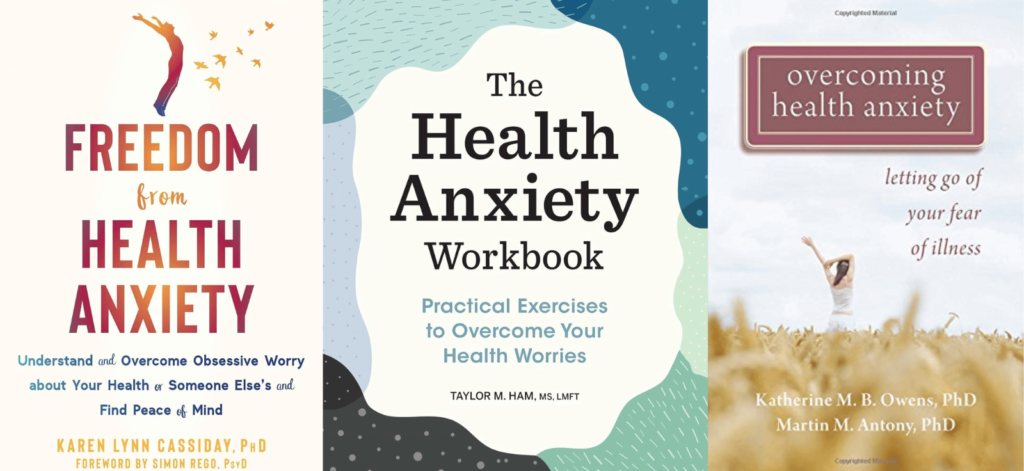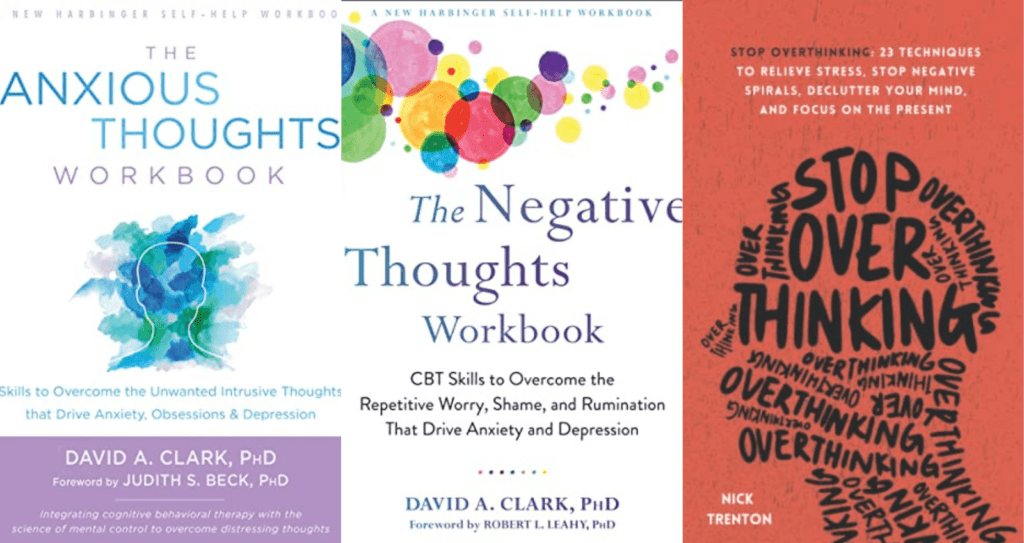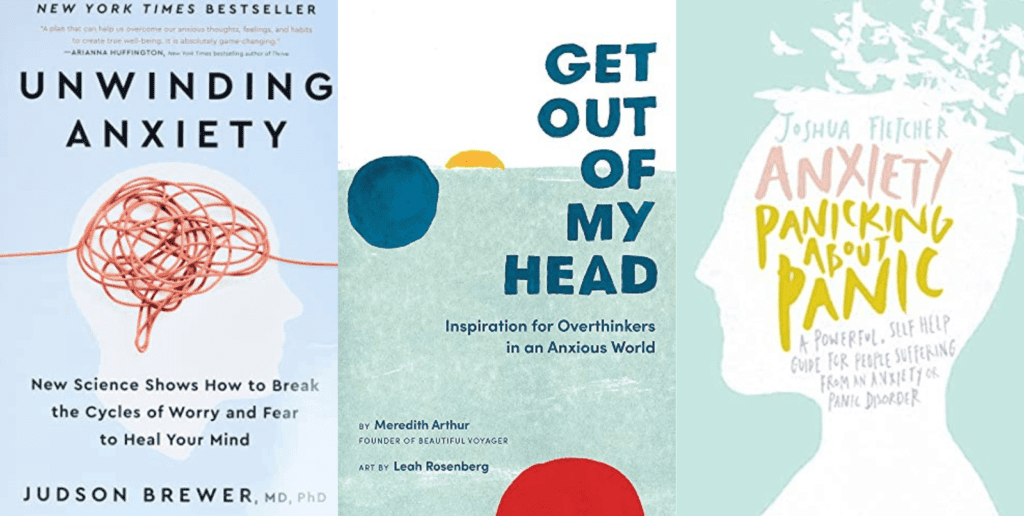The following are some of the best health anxiety books.
Disclosure: Some of the links below are affiliate links. This means that, at zero cost to you, I will earn an affiliate commission if you click through the link and finalize a purchase.
What Is Health Anxiety?
Health anxiety, also known as illness anxiety disorder or hypochondriasis, is a psychological condition characterized by excessive worry and fear about having a serious medical condition.
Individuals with health anxiety often interpret normal bodily sensations as signs of severe illness and tend to overestimate the likelihood of having a medical problem.
People with health anxiety may engage in excessive checking of their bodies for signs of illness, regularly seeking medical reassurance, and frequently researching health-related information, even when it is unnecessary or contradictory.
They may also experience significant distress and impairment in their daily functioning due to their preoccupation with health concerns.
The thoughts and worries associated with health anxiety are typically disproportionate to any actual medical evidence or symptoms.
Despite multiple medical reassurances, individuals with this condition often continue to have unfounded fears about their health.
The anxiety can persist for long periods, leading to significant distress and interference in various areas of life, including work, relationships, and overall well-being.
It is important to note that health anxiety is different from being cautious about one’s health or seeking appropriate medical care.
In health anxiety, the focus is on excessive and persistent worry about physical health that is not proportional to the actual risk or medical evidence.
Best Health Anxiety Books
1. Overcoming Health Anxiety
By Katherine Owens PhD, Martin M Antony PhD

The authors draw from their extensive experience in the field of psychology and provide a clear understanding of the underlying causes of health anxiety.
Through comprehensive explanations, relatable case examples, and evidence-based strategies, readers will gain insight into the cognitive and behavioral factors that contribute to health anxiety and learn how to challenge and change their fearful thoughts and behaviors.
Related: Top 10 Practical CBT Exercises For Generalized Anxiety Disorder Relief
2. The Health Anxiety Workbook
By Taylor M. Ham

In this workbook, Taylor M. Ham guides readers through a step-by-step process of understanding and addressing health anxiety.
The exercises offered are practical and grounded in cognitive-behavioral therapy (CBT) principles, which have been shown to be effective in treating anxiety disorders.
Related: High Functioning Anxiety Test (& How To Support Anxiety Recovery)
3. The Essential Guide To Health Anxiety
By Dennis Simsek

In this guide, Dr. Simsek explores the complex nature of health anxiety and provides readers with a deep understanding of its underlying causes and mechanisms.
Drawing from cognitive-behavioral therapy (CBT), acceptance and commitment therapy (ACT), and other evidence-based approaches, he presents a step-by-step roadmap for overcoming health anxiety.
Related: Impulsive vs Intrusive Thoughts (& How to Manage Them)
4. Conquering Health Anxiety
By Darren Sims

In this book, Dr. Sims delves into the intricate nature of health anxiety and explores its underlying causes.
Through a compassionate and evidence-based approach, he guides readers through a journey of self-discovery, offering practical tools to challenge and reframe anxious thoughts.
Related: Journal Prompts For Anxiety (+FREE Anxiety Worksheets)
5. Freedom from Health Anxiety
By Karen Lynn Cassiday PhD

Within the pages of “Freedom from Health Anxiety,” Dr. Cassiday dives deep into the core aspects of health anxiety, helping readers gain a better understanding of its underlying causes.
By shedding light on the cognitive, emotional, and behavioral patterns that fuel health anxiety, she provides a roadmap for transforming anxious thoughts into healthier and more constructive ones.
Related: Future Tripping: Top 9 Ways to Avoid Future-Tripping
6. Overcoming Health Anxiety
By Rob Willson, David Veale

In this book, Willson and Veale empower readers by explaining the underlying causes of health anxiety and teaching them how to challenge and modify their anxious thoughts.
Through the application of CBT techniques, readers will learn to identify cognitive distortions, recognize patterns of avoidance, and develop alternative, more balanced ways of thinking.
Related: Best 10 Intrusive Thoughts Books
7. No Worries: A Guided Journal
By Bella Mente Press

This guided journal encourages readers to engage in daily reflection and self-awareness, providing a safe space for expressing thoughts, emotions, and concerns.
By incorporating journaling into their routine, individuals can gain insight into their triggers, patterns of negative thinking, and areas where they can implement positive changes.
Related: Best 10 Books For Overthinking And Anxiety
How Health Anxiety Books Can Help?
Health anxiety books can be helpful in several ways.
Firstly, they provide individuals with valuable knowledge about health-related matters, enabling them to better understand their concerns and differentiate between rational worries and excessive anxiety.
By learning more about the body, illnesses, and the healthcare system, readers can gain a sense of control and reduce uncertainty.
Reading health anxiety books also offers a sense of validation, as individuals often realize that their fears and worries are not uncommon.
Knowing that others have similar experiences can alleviate feelings of isolation and provide reassurance that there is support available.
These books typically offer evidence-based strategies and techniques for managing health anxiety.
They may include cognitive-behavioral therapy (CBT) exercises designed to challenge irrational thoughts and replace them with more realistic and positive ones.
These tools are effective in helping individuals reframe their mindset, reduce anxiety levels, and develop healthier coping mechanisms.
Moreover, health anxiety books often provide guidance on relaxation techniques such as deep breathing, mindfulness meditation, and progressive muscle relaxation.
Engaging in these practices can help individuals calm their minds and bodies, reducing stress and anxiety associated with health concerns.
Related: Negative Core Beliefs List (& 8 Tips On How To Challenge Them)

Conclusion
While self-help books can be a valuable resource, they may not be sufficient for everyone.
For severe cases of health anxiety or when symptoms persist, it is recommended to seek professional support from a licensed mental health practitioner who can provide personalized guidance and treatment options tailored to the individual’s specific needs.
Related: +20 Overgeneralization Examples & How to Avoid It



